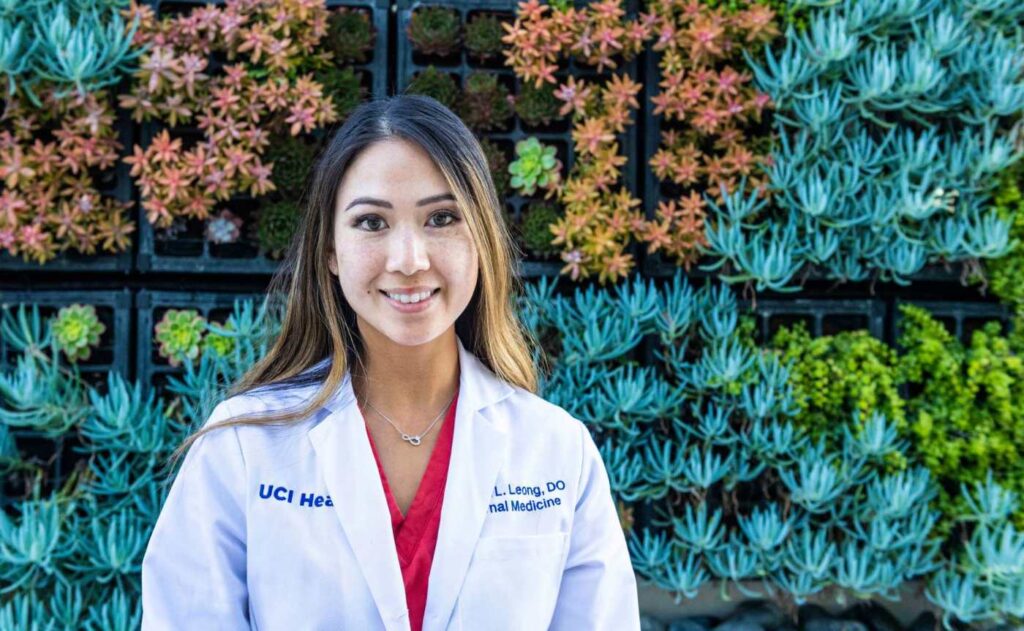
Orange County medical programs that specialize in treating people with lingering COVID-19 symptoms have gotten a surge of new patients following each spike in infections or appearance of a new variant.
As the omicron wave has begun to subside, some health professionals say their “long COVID” clinics are seeing younger patients than was typical earlier in the pandemic, and many of them didn’t get vaccinated before they contracted the virus.
“(After) this other wave that we just had came about, we’re seeing younger patients” compared with earlier in the pandemic, when many of them were in their 50s and 60s, said Dr. Natalia Covarrubias, a physical medicine and rehabilitation specialist who treats patients in the COVID Rehabilitation Program at Providence St. Jude Medical Center in Fullerton.
At UCI Health, which offers its “COVID recovery service” program at three locations around the county, “we are seeing more interest within the last month,” said Dr. Jaclyn Leong, the program’s co-director, adding, “every time there seems to be a surge, about four to six weeks later we see more interest in our clinic.”
UCI’s program also has recently seen a small shift toward patients in their 30s and younger, and “on average what I’ve been seeing is they’re unvaccinated,” Leong said.
Many people who get the virus will fully recover in days or weeks, but Leong said for every 10 people diagnosed with COVID-19, “at minimum, one of them will get long COVID symptoms.”
Even after their most acute symptoms are gone, those patients (also known as “long haulers”) may have other health issues: most commonly fatigue, sometimes from everyday activities; “brain fog” or cognitive problems; chest pain and shortness of breath, and a range of other symptoms.
For some, the aftereffects of COVID-19 may resolve in a week or two, but Leong and Covarrubias said they’ve seen patients with symptoms that linger more than a year.
That’s what happened to Ben Ginsberg, a 40-year-old from Aliso Viejo who is in post-COVID programs at UCI Health and Cedars-Sinai Medical Center in Los Angeles.
After contracting the virus in November 2020, Ginsberg was hospitalized for a week and was still “very, very debilitated” when he was sent home. Most of his symptoms have continued, with only minor improvements, he said.
Ginsberg used to work as a photographer and enjoyed activities at the beach and in the mountains, but “I can’t do any of that now. I can’t even hold my camera without getting short of breath just because of the strain,” he said.
His heart rate is higher than normal even when he’s at rest, and it spikes when he stands up, he said.
When a patient like Ginsberg comes to a post-COVID clinic, they’ll first be put through a variety of tests: bloodwork, stress tests, checks on heart and lung function, said Valerie Warren, a physical therapist at St. Jude. Then an array of specialists in the program will work together to create a treatment plan.
Warren said patients may be taught exercises to strengthen the muscles used for breathing, walking or standing, be guided through cognitive activities, or learn how and when to schedule rest breaks to help them get through daily tasks.
Exactly how and why COVID-19 may be causing symptoms long after the initial infection is gone are unclear, and it’s the subject of multiple studies. But some critics have questioned whether a “post-COVID syndrome” exists and suggested symptoms could be the result of unrelated health issues.
Covarrubias said whenever a patient has new or changing symptoms, providers want to help them regain the health and abilities they had before.
“I understand the concern that it might not be related (to COVID-19), but we’re going to treat it as if it is until we have data to suggest that it’s not,” she said.
Ginsberg said he didn’t know much about chronic illnesses before his COVID-19 experience, adding, “it’s very difficult for people to understand it, but that doesn’t mean it’s fake.”
Warren said as more people get vaccinated and there are fewer new infections, she’s hoping post-COVID clinics will become obsolete.
